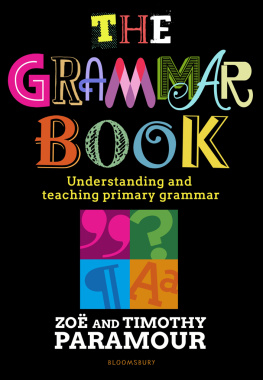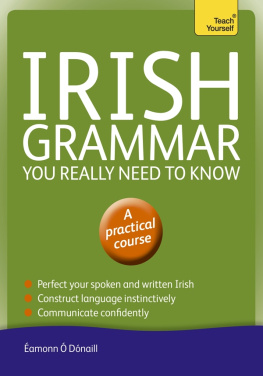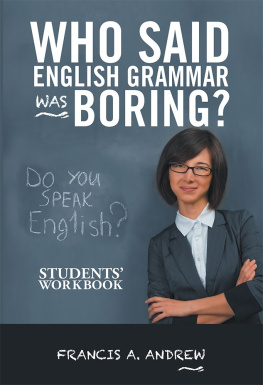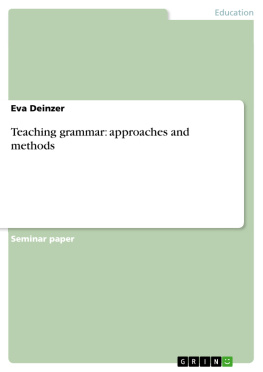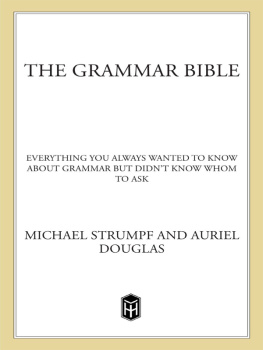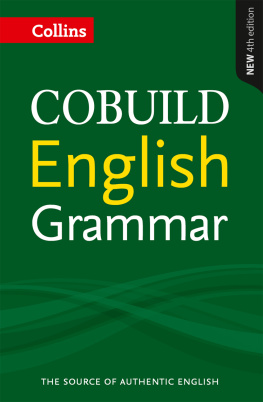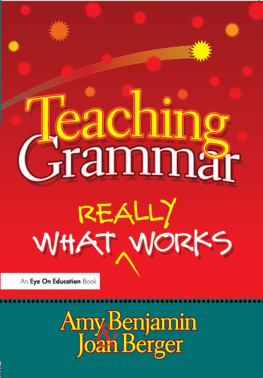Other titles from Bloomsbury Education
100 Ideas for Primary Teachers: Literacy by Rob Smith and Katherine Simpson
100 Ideas for Primary Teachers: Writing by Adam Bushnell, Rob Smith and David Waugh
How to be an Outstanding Primary Middle Leader by Zo Paramour
Igniting Childrens Writing by Mark McCaughan
Lets Perform: Monologues, duologues and poems for children to perform by Cath Howe
Teaching for Mastery in Writing by Mike Cain
Vocabulary Ninja by Andrew Jennings

BLOOMSBURY EDUCATION
Bloomsbury Publishing Plc
50 Bedford Square, London, WC1B 3DP, UK
This electronic edition published in 2020 by Bloomsbury Publishing Plc
BLOOMSBURY, BLOOMSBURY EDUCATION and the Diana logo are trademarks of Bloomsbury Publishing Plc
First published in Great Britain, 2020
Text copyright Zo and Timothy Paramour, 2020
Material from Department for Education documents used in this publication are approved under an Open Government Licence: www.nationalarchives.gov.uk/doc/open-government-licence/version/3
Zo and Timothy Paramour have asserted their rights under the Copyright, Designs and Patents Act, 1988, to be identified as Authors of this work
Bloomsbury Publishing Plc does not have any control over, or responsibility for, any third-party websites referred to or in this book. All internet addresses given in this book were correct at the time of going to press. The author and publisher regret any inconvenience caused if addresses have changed or sites have ceased to exist, but can accept no responsibility for any such changes
All rights reserved
You may not copy, distribute, transmit, reproduce or otherwise make available this publication (or any part of it) in any form, or by any means (including without limitation electronic, digital, optical, mechanical, photocopying, printing, recording or otherwise), without the prior written permission of the publisher. Any person who does any unauthorised act in relation to this publication may be liable to criminal prosecution and civil claims for damages.
A catalogue record for this book is available from the British Library
ISBN: 978-1-4729-7229-3 (PB)
ISBN: 978-1-4729-7230-9 (eBook)
ISBN: 978-1-4729-7228-6 (ePDF)
To find out more about our authors and their books please visit www.bloomsbury.com where you will find extracts, author interviews and details of forthcoming events, and to be the first to hear about latest releases and special offers, sign up for our newsletters.
For Bubbles, the cat with no eyebrows.
Contents
Acknowledgements
Writing a book can be a very isolating endeavour. Even writing as co-authors requires hours of work alone, at a computer. Luckily, we have some wonderful people around us who seem to tolerate us rambling on about grammar, way past the point of them losing interest.
Timothy
I want, first and foremost, to thank Hannah Marston, our fantastic editor. Id also like to thank all those people alongside whom I have battled grammar issues in schools, including everyone at Chorleywood, Holly Park and North Harringay, and especially Steve Baptiste, Kathy Noble, Jane Alexander, Emma Hassan and David Joyce. I also want to thank Joe Layburn and everyone who has taught English at Bancrofts over the last two years, especially Alex Adams, Clive Pearson, Nick Thomas and Sarah Strong. I need to give a special mention to my sister, Alexandra, whose help and advice on grammatical matters have been invaluable. Finally, of course, I need to thank my wife, Zo. If our love can survive writing a book about grammar together, it can survive anything.
Zo
Thank you to Hannah for listening politely when we pitched this idea way back in 2018. It has, once again, been a real pleasure working with you. Thank you for your support and belief in us and for fielding endless questions. I would also like to thank Caroline Spencer, Vicky Bingham and Lucy Szemerenyi for their endless support with this project and for encouraging me to speak out. Thanks to the staff at South Hampstead working with you continues to be a privilege. Thanks to GMF for providing the wine. I would also like to thank Kath Shaw for being my fellow grammar geek for over a decade now and for proofreading and editing my tweets. And finally, thanks to my husband, Tim. We often joked that writing this book was a test of our marriage. If that is true, we have passed with flying colours, although it will be quite nice to have a summer holiday where we dont discuss the conventions of adjuncts. Heres to our next adventure.
Introduction
Ms Armstrong doesnt look worried. She rarely does. Shes several years into her second successful headship; shes battled budget cuts and political change, and her staff are rightly confident in her. And maybe she isnt worried exactly, but shes certainly feeling a little out of her depth. This afternoon shes attending a meeting with her schools senior and middle leaders, where the English coordinator will unveil the new grammar scheme of work. Having had a quick flick through its pages, Ms Armstrong is aware that she isnt familiar with many of the words and phrases in the document, especially those at the top end of Key Stage 2: coordinating conjunction, subjunctive mood, past progressive tense. Ms Armstrong didnt learn about any of this when she was younger. She went to school in the seventies and eighties and she mostly remembers her English teachers being brilliant, but they taught her to write by exposing her to examples of writing, and most of her understanding of grammar, which she rightly believes to be pretty good, was absorbed by osmosis. She feels where the commas should go in a sentence and she usually gets it right but she cant necessarily explain how or why using technical linguistic terms. Shes always been an avid reader and a very competent writer. All the grammar stuff on the primary curriculum now just seems so unnecessary. She says nothing but silently curses Michael Gove.
In a classroom on the floor above, learning support assistant Mr Yildiz has just been handed next weeks English planning by the Year 6 class teacher. On Wednesday, he has to take a group of children who are struggling to identify the subject and object in a sentence out of class and help them. Theres just one problem and you can probably guess what it is: Mr Yildiz has no idea how to identify the subject and object in a sentence. He went to school in the nineties and noughties, when the National Literacy Strategy reigned supreme. His English lessons were rather more prescriptive and content-driven than Ms Armstrongs had been 20 years before but the content still seemed to be different from what children are learning now. Mr Yildiz and his family moved to Britain from Turkey when he was four years old and he can see some logic in teaching grammar discretely. He often used to make mistakes with verb tenses that would never cause problems for native English speakers. His teachers would circle or underline them but they rarely explained why they were wrong. Even now, he can still make these mistakes if hes not careful and its really embarrassing. Mr Yildiz wants to do his PGCE next year and become a teacher but hes worried that his colleagues will think he isnt clever enough.
Down the road, Mrs Patterson is helping her ten-year-old son with his English homework. A word in a sentence has been underlined and he has to state whether its a determiner, a pronoun or a preposition. Mrs Patterson has been googling all three words for half an hour to try to come up with an answer and she thinks she might be getting somewhere. Its certainly not the most baffling task hes come home with this year; a fortnight ago hed had this piece of work to do about

